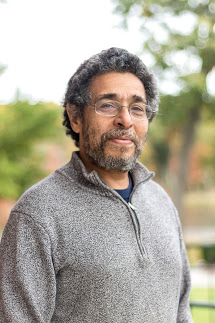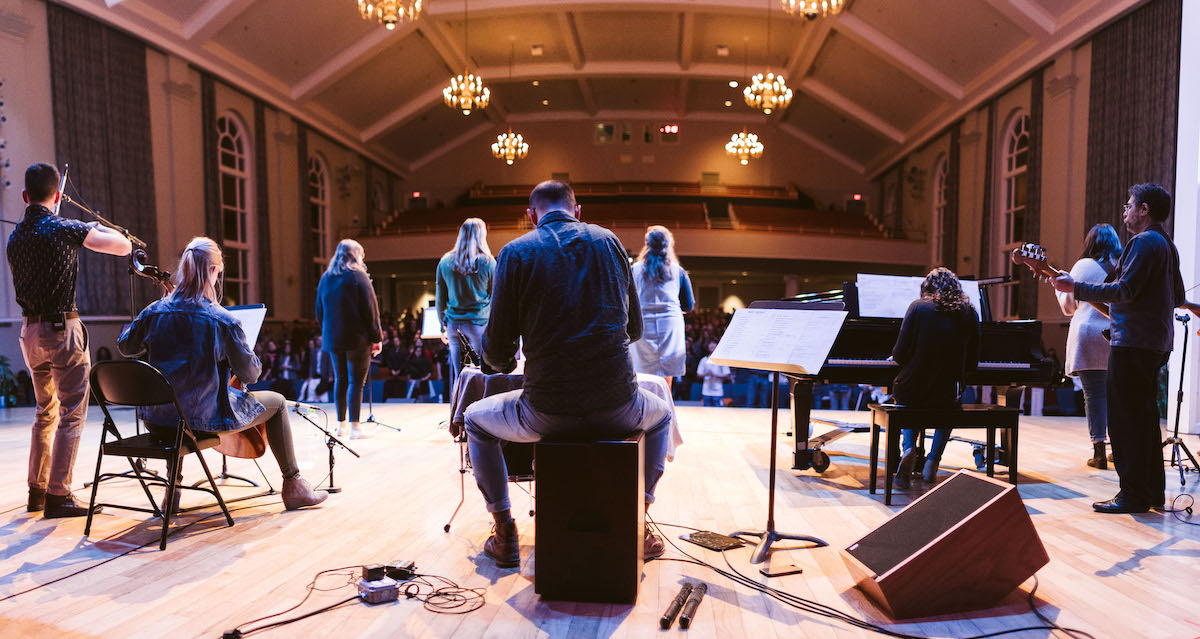How Much of Dr. King’s Dream Came True? An Interview with Bil Mooney-McCoy, Part I
Today, we celebrate the life and legacy of Dr. Martin Luther King Jr. Although we may often picture Dr. King in towns like Selma, Birmingham and Montgomery, he spent many of his formative years in Boston. Before he became the face of the civil rights movement, he was a earning his Ph.D. in systematic theology at Boston University. It was there that he met his wife and pastored a church and even met Gordon alumnus and civil rights activist Rev. Dr. Arthur L. Whitaker ’49.
To honor Dr. King, The Bell interviewed Director of Worship Bil Mooney-McCoy who, in addition to his work as an accomplished musician, is a teacher of racial reconciliation (which he’ll help us redefine later) and the father of a professional Christian rapper. In his six years at Gordon, Mooney-McCoy has worked hard to bring more diversity and creativity to how our campus community worships God.
To start, we asked him: Where are we at with Dr. King’s Dream?
The Bell: Where has there been the most progress?
Mooney-McCoy: I will say that there’s been a lot of progress. When I was born, Jim Crow was still with us. It was legal to be racist, basically. I am a product of the Boston Public Schools. My school committee deliberately worked very hard to make sure the school stayed as segregated as possible. That’s been documented so much that the [school district] got taken to the court and lost. When I was born, interracial marriages were illegal in many states and, among white evangelical Christians, considered immoral. That’s no longer true. We see interracial marriages all over the place.
There are things like the African American history museum in D.C. or the Lynching Project down in the South. Black studies departments did spring up in my lifetime. That’s wonderful. Books about race, like Sheila Wise Rowe’s book Healing Racial Trauma, are a triumph. (She’s the wife of [Dean of Student Engagement] Nick Rowe). It’s also wonderful that the conversation [about race] is not just black and white. It’s recognizing that Asian, Hispanic and Native American folks also have a story.
Where has there been the least progress?
Mooney-McCoy: As a kid in high school, middle school, even college in the city of Boston, being black was a physical liability. I could turn a corner or bump into a bunch of white kids and get beat up anytime. Being called the N-word on the street was normal. The last time that happened to me was in 1982, maybe ’83. And then there was a period where suddenly I wasn’t scared to go into certain neighborhoods anymore. I didn’t expect it to be called names on the street.
And that was wonderful. I thought, “Oh, great, my kids will not have to deal with this.” Then things went backwards. In the last six years, about the time of Trayvon Martin, we have reverted and racial incidents on the street are increasing again.
I am deeply saddened that my granddaughter is going to have to experience the same crap that I experienced being black. That just breaks my heart. There is no longer Jim Crow. There’s no longer “white only” signs out front, but mass incarceration is the new Jim Crow. It is infuriating to me that thousands of our kids are currently locked up for selling marijuana a few years ago, while white businessmen in suits are currently doing the same and making huge profits legally. Our public schools are not integrated. Many metrics are saying [school segregation] is worse than it used to be.
How is music a tool for racial reconciliation?
Mooney-McCoy: There’s a trend among those of us who are in this field to change the term from racial reconciliation to racial conciliation. Reconcile implies that at one point we were together. When I look at the history of this country’s racial dynamics, I can’t find an era where we would consider us conciled. I know that’s a hard statement. But I think it really is more honest. Reconciled implies that we’re going to get back to where we were. We don’t want to go back.
How is music a tool for racial conciliation?
Mooney-McCoy: In music we can learn about each other. Sharing music together is a place of intimacy. When we actually dare to explore each other’s music, we get to know each other’s cultures or each other’s values.
To see the rest of The Bell’s two-part interview with Bil Mooney-McCoy, read How Does Race Affect Daily Life in America? An Interview with Bil Mooney-McCoy, Part II
 The Bell
The Bell